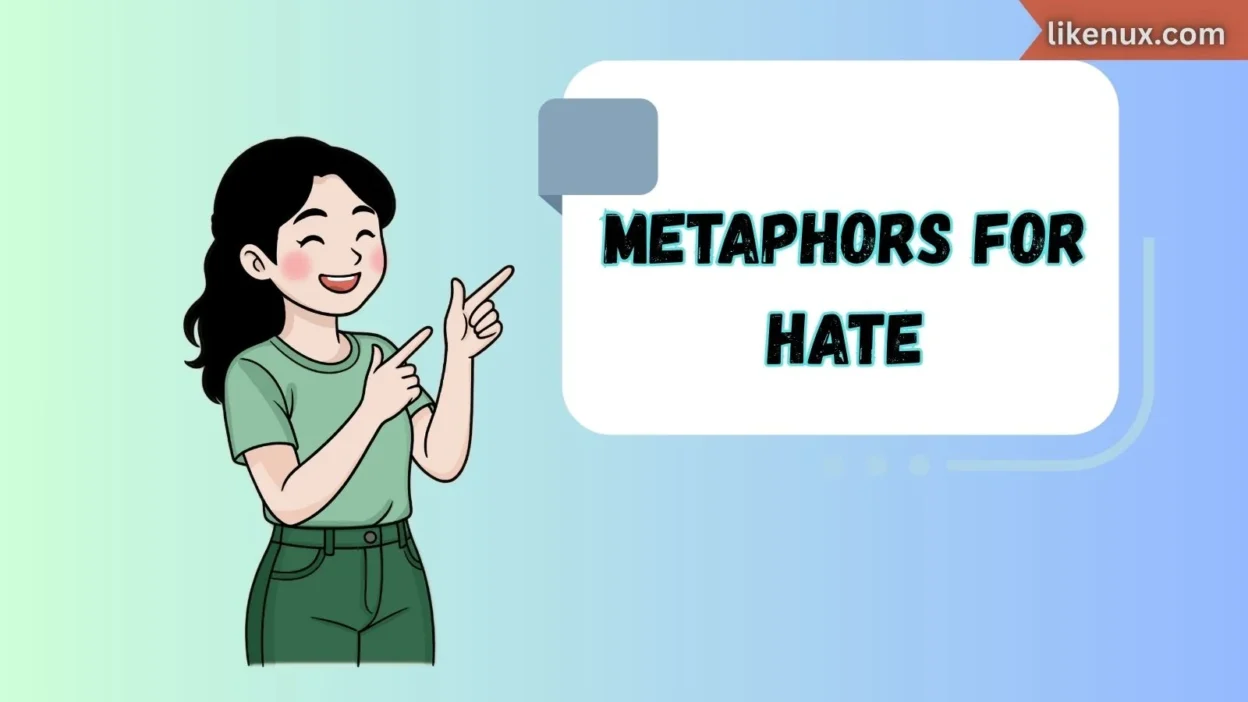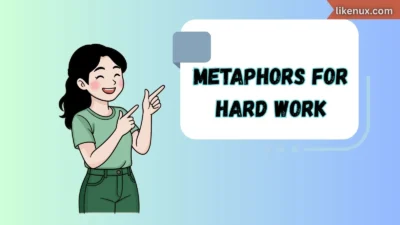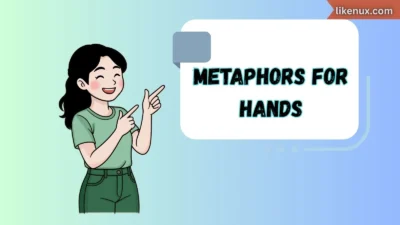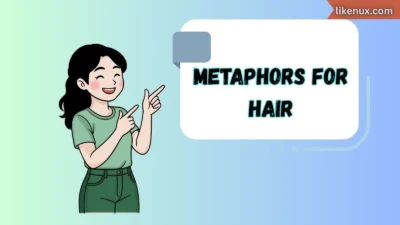When it comes to expressing emotions, few words carry as much intensity as hate. It is a powerful feeling that, when left unspoken, can eat away at our peace of mind. Yet, sometimes directly saying “I hate” may sound too harsh or blunt. That’s where Metaphors for Hate step in—they help us communicate strong emotions with more thoughtfulness, care, and nuance.
In this article, I’ll share 25 metaphors for hate, each explained in simple terms. You’ll see their meanings, examples in sentences, best usage, and even alternative ways to say them. Think of this as a creative guide to expressing yourself with both clarity and empathy.
Having dealt with difficult emotions myself, I know that finding the right words makes conversations easier and less hurtful. Whether you’re a student, a writer, or simply someone trying to communicate better, these metaphors will help you express hate in ways that feel authentic yet considerate.
1. Hate is a Poison
Meaning: Hate slowly harms the person holding it.
Sentence: “Carrying that much hate is like drinking poison every day.”
Best Use: When you want to show how destructive hate can be.
Other Ways to Say: Bitterness, venom, toxin.
2. Hate is a Fire
Meaning: It burns uncontrollably if not managed.
Sentence: “Her hate for injustice burned like a raging fire.”
Best Use: Describing intense, consuming feelings.
Other Ways to Say: Blaze, flame, inferno.
3. Hate is a Storm
Meaning: Hate is wild, chaotic, and destructive.
Sentence: “His words came like a storm of hate.”
Best Use: Highlighting emotional turmoil.
Other Ways to Say: Tempest, whirlwind, hurricane.
4. Hate is a Shadow
Meaning: It follows and darkens everything.
Sentence: “A shadow of hate lingered over their relationship.”
Best Use: Subtle, hidden forms of dislike.
Other Ways to Say: Darkness, gloom, cloud.
5. Hate is a Prison
Meaning: Hate traps the person who holds it.
Sentence: “He lived in a prison built from his hate.”
Best Use: Showing emotional confinement.
Other Ways to Say: Cage, confinement, chains.
6. Hate is a Thorn
Meaning: It causes constant pain.
Sentence: “Her hate was a thorn in her heart.”
Best Use: Lingering, sharp feelings.
Other Ways to Say: Spike, prickle, splinter.
7. Hate is a Weight
Meaning: It drags you down emotionally.
Sentence: “Carrying hate feels like dragging a heavy weight.”
Best Use: When showing burden or exhaustion.
Other Ways to Say: Load, anchor, baggage.
8. Hate is a Disease
Meaning: It spreads and weakens you.
Sentence: “His hate was a disease that infected his mind.”
Best Use: To show long-term damage.
Other Ways to Say: Illness, sickness, plague.
9. Hate is a Cage of Fire
Meaning: Painful and trapping at the same time.
Sentence: “Her hate kept her in a cage of fire.”
Best Use: Extreme, destructive feelings.
Other Ways to Say: Burning trap, fiery prison.
10. Hate is Rust
Meaning: It corrodes the heart over time.
Sentence: “His hate rusted away his kindness.”
Best Use: Slow destruction of character.
Other Ways to Say: Corrosion, decay, erosion.
11. Hate is a Monster
Meaning: A beast that controls and devours you.
Sentence: “The monster of hate consumed his better nature.”
Best Use: Describing uncontrollable feelings.
Other Ways to Say: Beast, demon, creature.
12. Hate is a Wall
Meaning: It blocks connection and understanding.
Sentence: “Hate built a wall between them.”
Best Use: When relationships suffer.
Other Ways to Say: Barrier, fence, divide.
13. Hate is Ice
Meaning: Cold and unfeeling.
Sentence: “His hate was like ice in his veins.”
Best Use: For emotionless, cruel hate.
Other Ways to Say: Frost, chill, freeze.
14. Hate is a Dark River
Meaning: It flows endlessly and powerfully.
Sentence: “Hate ran through him like a dark river.”
Best Use: To show steady and deep emotions.
Other Ways to Say: Stream, current, flood.
15. Hate is a Mask
Meaning: It hides true feelings like pain or fear.
Sentence: “She wore her hate like a mask.”
Best Use: Hidden dislike.
Other Ways to Say: Cover, disguise, veil.
16. Hate is a Knife
Meaning: It cuts deeply and wounds others.
Sentence: “Every word was a knife of hate.”
Best Use: Describing sharp, painful actions.
Other Ways to Say: Blade, dagger, sword.
17. Hate is a Mirror
Meaning: It reflects the insecurities of the hater.
Sentence: “Hate is often just a mirror of our fears.”
Best Use: For self-reflective conversations.
Other Ways to Say: Reflection, echo, projection.
18. Hate is a Chain
Meaning: It binds people to negativity.
Sentence: “The chains of hate kept him bitter.”
Best Use: Showing restriction.
Other Ways to Say: Shackles, links, bonds.
19. Hate is a Desert
Meaning: It leaves life empty and barren.
Sentence: “Her soul was a desert of hate.”
Best Use: Expressing emotional emptiness.
Other Ways to Say: Wasteland, barrenness, emptiness.
20. Hate is a Storm Cloud
Meaning: It looms and threatens trouble.
Sentence: “A storm cloud of hate gathered in the room.”
Best Use: Building tension.
Other Ways to Say: Overcast, thundercloud, gloom.
21. Hate is a Battle
Meaning: It’s constant conflict inside the heart.
Sentence: “He fought a battle of hate and forgiveness.”
Best Use: To show inner struggle.
Other Ways to Say: War, fight, clash.
22. Hate is a Scar
Meaning: A lasting mark from past hurt.
Sentence: “Her hate was a scar from old wounds.”
Best Use: Long-term resentment.
Other Ways to Say: Mark, wound, reminder.
23. Hate is a Fog
Meaning: It clouds judgment and vision.
Sentence: “Hate covered his mind like a fog.”
Best Use: Describing confusion.
Other Ways to Say: Mist, haze, blur.
24. Hate is a Burning Coal
Meaning: Holding onto it only hurts you.
Sentence: “Clutching hate is like holding a burning coal.”
Best Use: Teaching self-reflection.
Other Ways to Say: Ember, spark, cinder.
25. Hate is a Prisoner’s Shackles
Meaning: It keeps you tied to the past.
Sentence: “Hate chained him to his past like shackles.”
Best Use: Explaining emotional captivity.
Other Ways to Say: Restraints, cuffs, bindings.
FAQs
1. Why use metaphors for hate instead of direct words?
Metaphors help soften harsh expressions and allow us to express deep feelings without sounding aggressive.
2. Can metaphors make my writing more powerful?
Yes! They bring imagery and emotion, making your words more relatable and memorable.
3. Are these metaphors suitable for academic writing?
Some are—especially those like “hate is a poison” or “hate is a wall.” Others may be better for creative writing.
4. How can I use these metaphors in daily life?
You can use them in journaling, essays, conversations, or even when explaining your emotions to someone.
5. Do metaphors make difficult conversations easier?
Absolutely. They allow you to express strong emotions in a gentler, more thoughtful way.
Conclusion
Hate is a heavy emotion—but expressing it doesn’t always need to be harsh. Using metaphors can help you share your feelings in ways that are creative, thoughtful, and empathetic. They let you paint pictures with words while keeping conversations respectful and meaningful.
From “hate is a poison” to “hate is a burning coal,” these 25 metaphors give you tools to express emotions with care. Remember, the words we choose can either build bridges or walls—so let’s choose wisely, even when talking about difficult feelings.

David Robert is a passionate innovator driven by creativity, vision, and purpose. He turns bold ideas into impactful realities through focus, leadership, and dedication.



